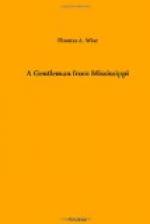The girl was startled. She had not thought that things would go this far.
“I told him how Haines wanted to get in some land speculation scheme with Altacoola, how we tricked him and caught him with the goods when he made the proposition to me and how we forced him to confess.”
“You told father that?” gasped Carolina.
Norton nodded.
“I don’t understand it,” said Langdon. “To think that he was that kind!”
Son Randolph now took his turn in the case against the secretary.
“We were both here, father. I heard him—Carolina heard him,” he said. “Didn’t you, Carolina?”
“Yes,” said the girl weakly, “I was here.” Then she turned abruptly. “I must go,” she said, “must go right away. Mrs. Holcomb is waiting for me.”
The Senator turned to his desk bent and discouraged.
“I suppose I should have taken a secretary who was a Southerner and a gentleman. Well, Randolph, you’ll have to act now. Take this letter—”
The young man sat down and took the following from the Senator’s diction:
“Mr. Haines—
“Sir: I quite understand
your feelings and the impossibility of
your continuing in my employ.
The least said about it the better.
I am sorry, too.
“William H. Langdon.”
“You boys run away. I’ve got to think,” said the Senator.
When the pair had gone the old man drew the letter to him, and below his signature he added a postscript: “Don’t forget there’s some money coming to you.”
Walking across the room to leave, he sighed:
“He was making the best kind of a secretary.”
CHAPTER XVI
A RESCUE IN THE NICK OF TIME
Later in that never-to-be-forgotten day Bud Haines ventured back to his desk in the committee room, after first ascertaining that Senator Langdon would not return. Some of the Senator’s papers must be straightened out, and he wanted personal documents of his own.
The secretary regretfully, sorrowfully performed these final duties and found himself stopping at various intervals to try to explain to himself how he had been deceived in both the Langdons, father and daughter. He had to give up both problems. To him neither was explainable. “I’ve known enough Senators to know that I’d never meet an honest one,” he muttered. “But as to women—well, there’s too much carefully selected wisdom in their innocence to suit me.”
This cynic, new born from the shell of the chronic idealist that was, suddenly was disturbed in his ruminations by a sound at the door. Looking up, he saw Hope Georgia Langdon standing, shyly, embarrassed, in the main entrance.
“Mr. Haines,” she said, timidly.
Bud jumped to his feet.
“Yes, Miss Hope Georgia.”
As the Senator’s younger daughter came toward him he noticed that she was excited over something, and for a newly made cynic he took altogether too much notice of her youthful beauty, her fresh, rosy complexion and her dancing, sparkling eyes. The thought occurred to him, “What a woman she will make—if she doesn’t imitate her sister!”




